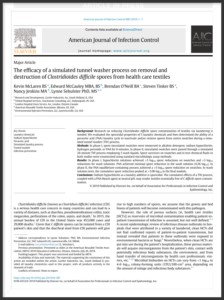September 5th, 2019


ARTA is pleased to announce that its study on the effectiveness of peracetic acid (PAA) to kill Clostridioides difficile (C. diff) spores is now available for download from the American Journal of Infection Control (AJIC). The ARTA study — “The efficacy of a simulated tunnel washer process on removal and destruction of Clostridioides difficile spores from healthcare textiles” — is now available “In Press,” which means it has been accepted for publication but has not yet been published in hard copy by AJIC, according to a recent ARTA release.
AJIC is a peer-reviewed scientific journal produced by the Association for Prevention and Infection Control and Epidemiology (APIC).
“The ability to kill C-diff in healthcare textiles is critical to professional laundries and ARTA has therefore purchased Open Access for this article, which means everyone can easily download and read the study,” says ARTA President Brendan O’Neill of London Hospital Linen Service, London, Ontario. O’Neill adds that this is an important study to share with healthcare clients.
AJIC editors say the article will likely be published in the next six months or as soon as October. This study was funded by ARTA and conducted with assistance from Accuratus Lab. Many thanks to study authors: Kevin McLaren and Steve Tinker, Gurtler Industries; Ed McCauley, UHS; Brendan O’Neill, London Hospital Textile Service; and Lynne Sehulster, PhD, Environmental Infection Prevention, LLC. Nancy Jenkins, executive director of ARTA, served as project manager for the study.
Kevin McLaren, Director of R&D for Gurtler Industries, managed and directed the study. Kevin’s background in microbiological testing protocols and procedures was instrumental in the design and execution of the series of tests that are reported in the publication. Kevin, with Dr. Lynn Sehulster were the primary authors of the study. Steven Tinker, Sr. Vice President of R&D and Marketing for Gurtler Industries, also contributed to the development of the study’s design parameters.
The abstract of the study follows:
Background: Research on reducing Clostridioides difficile spore contamination of textiles via laundering is needed. We evaluated the sporicidal properties of 5 laundry chemicals and then determined the ability of a peracetic acid (PAA) laundry cycle to inactivate and/or remove spores from cotton swatches during a simulated tunnel washer (TW) process.
Methods: In phase I, spore-inoculated swatches were immersed in alkaline detergent, sodium hypochlorite, hydrogen peroxide, or PAA for 8 minutes. In phase II, inoculated swatches were passed through a simulated 24-minute TW process employing 5 wash liquids. Spore survivors on swatches and in test chemical fluids in both studies were enumerated using standard microbiologic assay methods.
Results: In phase I, hypochlorite solutions achieved >5 log10 spore reductions on swatches and >3 log10 reductions for wash solutions. PAA achieved minimal spore reduction in the wash solution (0.26 log10). In phase II, the PAA equilibrium-containing process achieved a >5 log10 spore reduction on swatches. In wash solution tests, the cumulative spore reduction peaked at >3.08 log10 in the final module.
Conclusions: Sodium hypochlorite as a laundry additive is sporicidal. The cumulative effects of a TW process, coupled with a PAA bleach agent at neutral pH, may render textiles essentially free of C difficile spore contamination.
Download the full ARTA study here: https://www.sciencedirect.com/science/article/pii/S0196655319304638

